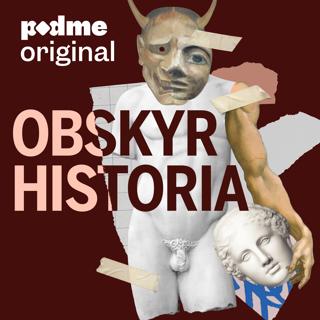
The Gladiatrix
Mention the word gladiator and you would be forgiven for instantly thinking of the 2000 namesake epic movie. Of spectators watching on as men battled each other with a variety of weapons, sometimes to the death, for the entertainment of the crowd. But did women also fight as gladiators? Was the gladiatrix a thing? The references are rare and vague and much debate still surrounds this topic. To talk through the literary and archaeological evidence that survives, Tristan chatted to Alisa Vanlint at the Chalke Valley History Festival. A member of Legio II Augusta, Alisa is an actor and gladiatorial combat specialist. Hosted on Acast. See acast.com/privacy for more information.
3 Aug 202123min

Alexander the Great’s Corpse & the Greatest Heist in History
Alexander the Great is one of the most famous generals and empire builders in history, but the story of his death is almost as remarkable as his life. For this episode, our host and Alexander the Great superfan, Tristan Hughes, joins Dan Snow to tell the almost unbelievable tale of what happened after Alexander died. The ensuing titanic struggle for power and control over Alexander's empire involves war, body snatching, extremely slow carriage chases and a thousand soldiers being eaten alive by crocodiles in the Nile. Hosted on Acast. See acast.com/privacy for more information.
1 Aug 202130min

The Sacred Band of Thebes
The Theban Sacred Band was one of the greatest military corps of Ancient Greece, thriving from the city-state of Thebes for almost 50 years in the mid 4th century BC. In addition to their fighting prowess, however, there is another fascinating aspect to their history; this 300-man elite corps was made up of 150 pairs of male lovers, many of them buried side by side where they fell in battle. To hear more about this, Tristan spoke to James Romm, author, reviewer, and James H. Ottaway Jr. Professor of Classics at Bard College in Annandale, New York. James gives us a glimpse of Theban democracy, power struggles between leading city-states, and the growth of eros, sexual love, in Greek public life. His book ‘The Sacred Band’ is out now. Hosted on Acast. See acast.com/privacy for more information.
29 Juli 202129min

The Begram Hoard: Treasures of the Silk Road
In the mid-20th century French archaeologists came across a remarkable collection of ancient items from Eastern China, the Indian subcontinent and the Roman Mediterranean, all in one place. In this second episode about Begram, Tristan is once again joined by the University of Freiburg’s Lauren Morris, who takes us into the details of the lacquerwares, ivory furniture, bronzes and glassware. Lauren and Tristan then explore what the hoard tells us about the global nature of this area in Central Asia during its golden age in the 1st - 4th centuries AD. Hosted on Acast. See acast.com/privacy for more information.
27 Juli 202145min

Decoding the Roman Dead
Often known as ‘Britain’s first town’, Colchester is a city rich in ancient history and on 24 July 2021, a new exhibition will open at the Colchester Museum revealing more about some of its earliest Roman occupants. Called ‘Decoding the Roman Dead’, the exhibition focuses around cremations found in the area around Colchester dating to almost 2,000 years ago. Thanks to new scientific methods, the team have been able to analyse these burnt remains and find out some astonishing details about who these people were. From gender to pathology to where in the Roman Empire these people came from. To talk all about the new exhibition, and to shine a light on the wealth of information archaeologists can learn from ancient cremations, Tristan chatted to Dr Carolina Lima and Glynn Davis. Carolina and Glynn are two of the curators of the exhibition.To find out more, visit their website: https://colchester.cimuseums.org.uk/dtrd/ Hosted on Acast. See acast.com/privacy for more information.
25 Juli 202144min

Life in Sparta
A legendary city-state in Ancient Greece, we associate Sparta with fierce warriors in battle. But what about the everyday? In this second episode with Professor Stephen Hodkinson, we discuss the eating habits, training and even kingship of Sparta. Stephen is Emeritus Professor of Ancient History at the University of Nottingham.Part 1 - The Truth About Spartan Society: https://podfollow.com/the-ancients/episode/f08dc2f18e4fabe1ecf7ee5bd91d88bc44b2f2b2/view Hosted on Acast. See acast.com/privacy for more information.
22 Juli 202124min

The Oldest Known Shark Attack
It’s a crossover with Jaws and Open Water that we never expected, but a 3,000 year old corpse has thrown a surprising topic into the mix: shark bites. The body, found in the prehistoric Tsukumo hunter-gatherer burial site in Japan, unexpectedly presented evidence of traumatic injuries compatible with a shark bite, making it the earliest known victim of a shark attack. Following this discovery, Tristan spoke to Alyssa White from the University of Oxford. Alyssa was part of the team who studied body No. 24. She explains how they came across No. 24, the evidence which led them towards the cause of death, and the archaeological science and forensic techniques used to recreate the misfortune of this early shark victim. Hosted on Acast. See acast.com/privacy for more information.
20 Juli 202127min

The Romans in Brittany
It was one of the most powerful empires in history, leaving marks and remnants across the globe, but in this episode we are looking specifically at the impact of the Romans on Brittany. Tristan was joined once again by Sir Barry Cunliffe, who takes us through the Roman occupation of Brittany, the response of the residents, and the impact on both cultures. From slaves and wine, to fish sauce and rebellion, this is an intriguing look into the character of Brittany and the realities of a Roman occupation. Emeritus Professor at the University of Oxford, Sir Barry Cunliffe is the author of Bretons and Britons: The Fight for Identity. Hosted on Acast. See acast.com/privacy for more information.
17 Juli 202136min




















